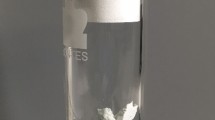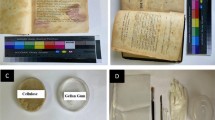Abstract
In this study, aqueous extracts of cotton linter paper and “Hanji”, which is a Korean traditional paper, were analyzed to evaluate the deterioration of paper cultural heritage. We quantified cello-oligosaccharides, which are water-soluble low-molecular-weight carbohydrates, in extracts from the two types of paper. The degree of polymerization (DP) of aged paper was also evaluated based on the absolute molecular weight of cellulose. The content of water-soluble cello-oligosaccharides (COS) varied according to the degree of cellulose degradation. Therefore, the cellulose hydrolysis rate could be predicted from the linear relationship between the cellulose hydrolysis rate and the water-soluble COS content. The DP calculated using the predicted cellulose hydrolysis rate was accurate if the amount of cello-oligosaccharides extracted exceeded the limit of quantification of COS. Consequently, among the many minimally invasive methods available, this methodology may provide an indirect method to evaluate cellulose degradation by quantifying the carbohydrates dissolved in extracts of cotton linter paper and Hanji.







Similar content being viewed by others
Availability of data and materials
All data generated or analyzed during this study are included in this published article.
References
Ali M, Emsley AM, Herman H, Heywood RJ (2001) Spectroscopic studies of the ageing of cellulosic paper. Polymer 42:2893–2900. https://doi.org/10.1016/S0032-3861(00)00691-1
Area MC, Cheradame H (2011) Paper aging and degradation: recent findings and research methods. BioResources 6:5307–5337
Ávila PF, Silva MF, Martins M, Goldbeck R (2021) Cello-oligosaccharides production from lignocellulosic biomass and their emerging prebiotic applications. World J Microbiol Biotechnol 37:73. https://doi.org/10.1007/s11274-021-03041-2
Berggren R, Berthold F, Sjöholm E, Lindström M (2003) Improved methods for evaluating the molar mass distributions of cellulose in kraft pulp. J Appl Polym Sci 88:1170–1179. https://doi.org/10.1002/app.11767
Bicchieri M, Sodo A, Piantanida G, Coluzza C (2006) Analysis of degraded papers by non-destructive spectroscopic techniques. J Raman Spectrosc 37:1186–1192. https://doi.org/10.1002/jrs.1603
Blümich B, Anferova S, Sharma S, Segre AL, Federici C (2003) Degradation of historical paper: nondestructive analysis by the NMR-MOUSE. J Magn Reson 161:204–209. https://doi.org/10.1016/S1090-7807(03)00034-X
Bohrn R, Potthast A, Schiehser S, Rosenau T, Sixta H, Kosma P (2006) The FDAM method: determination of carboxyl pro-files in cellulosic materials by combining group-selective fluorescence labeling with GPC. Biomacromol 7:1743–1750. https://doi.org/10.1021/bm060039h
Bronzato M, Calvini P, Federici C, Dupont AL, Meneghetti M, Marco VD, Biondi B, Zoleo A (2015) Degradation by-products of ancient paper leaves from wash waters. Anal Methods 7:8197–8205. https://doi.org/10.1039/c5ay01114k
Calvini P, Gorassini A (2006) On the rate of paper degradation: lessons from the past. Restaur 27:275–290. https://doi.org/10.1515/REST.2006.275
Carter HA (1996) The chemistry of paper preservation: Part 1. The aging of paper and conservation techniques. J Chem Educ 73. https://doi.org/10.1021/ed073p417
Chen P, Shrotri A, Fukuoka A (2019) Soluble cello-oligosaccharides produced by carbon-catalyzed hydrolysis of cellulose. Chemsuschem 12:2576–2580. https://doi.org/10.1002/cssc.201900800
Chiriu D, Ricci PC, Cappellini G, Salis M, Loddo G, Carbonaro CM (2018) Ageing of ancient paper: a kinetic model of cellulose degradation from Raman spectra. J Raman Spectrosc 49:1802–1811. https://doi.org/10.1002/jrs.5462
Dupont AL, Egasse C, Morin A, Vasseur F (2007) Comprehensive characterisation of cellulose- and lignocellulose-degradation products in aged paper: Capillary zone electrophoresis of low-molar mass organic acids, carbohydrates, and aromatic lignin derivatives. Carbohydr Polym 68:1–16. https://doi.org/10.1016/j.carbpol.2006.07.005
Emsley AM, Stevens GC (1994) Kinetics and mechanisms of the low-temperature degradation of cellulose. Cellulose 1:26–56. https://doi.org/10.1007/BF00818797
Evans R, Wallis AFA (1989) Cellulose molecular weights determined by viscometry. J Appl Polym Sci 37:2331–2340. https://doi.org/10.1002/app.1989.070370822
Gray MC, Converse AO, Wyman CE (2003) Sugar monomer and oligomer solubility. Data and predictions for application to biomass hydrolysis. Appl Biochem Biotechnol 105:179–193
Hatfield R, Fukushima RS (2005) Can lignin be accurately measured? Crop Sci 45:832–839. https://doi.org/10.2135/cropsci2004.0238
Henniges U, Vejdovszky P, Siller M, Jeong MJ, Rosenau T, Potthast A (2014) Finally dissolved! Activation procedures to dissolve cellulose in DMAc/LiCl prior to size exclusion chromatography analysis—a review. Curr Chromatogr 1:52–68
Jeong M-J, Kang K-Y, Bacher M, Kim H-J, Jo B-M, Potthast A (2014) Deterioration of ancient Korean paper, Hanji: evaluation of paper permanence. Cellulose 21:4621–4632. https://doi.org/10.1007/s10570-014-0455-4
Jónsdóttir SO, Cooke SA, Macedo EA (2002) Modeling and measurements of solid-liquid and vapor-liquid equilibria of polyols and carbohydrates in aqueous solution. Carbohydr Res 337:1563–1571. https://doi.org/10.1016/S0008-6215(02)00213-6
Kostic M, Potthast A, Rosenau T, Kosma P, Sixta H (2006) A novel approach to determination of carbonyl groups in DMAc/LiCl-insoluble pulps by fluorescence labeling. Cellulose 13:429–435. https://doi.org/10.1007/s10570-005-9040-1
Oberlerchner JT, Rosenau T, Potthast A (2015) Overview of methods for the direct molar mass determination. Molecules 20:10313–10341. https://doi.org/10.3390/molecules200610313
Potthast A, Röhrling J, Rosenau T, Borgards A, Sixta H, Kosma P (2003) A novel method for the determination of carbonyl groups in cellulosics by fluorescence labeling. 3. Monitoring oxidative processes. Biomacromolecules 4:746–749. https://doi.org/10.1021/bm025759c
Röhrling J, Potthast A, Rosenau T, Lange T, Ebner G, Sixta H, Kosma P (2002a) A novel method for the determination of carbonyl groups in cellulosics by fluorescence labeling. 1. Method development. Biomacromolecules 3:959–968. https://doi.org/10.1021/bm020029q
Röhrling J, Potthast A, Rosenau T, Lange T, Borgards A, Sixta H, Kosma P (2002b) A novel method for the determination of carbonyl groups in cellulosics by fluorescence labeling. 2. Validation and applications. Biomacromolecules 3:969–975. https://doi.org/10.1021/bm020030p
Sistach MC, Ferrer N, Romero MT (1998) Fourier transform infrared spectroscopy applied to the analysis of ancient manuscripts. Restaur 19:173–186. https://doi.org/10.1515/rest.1998.19.4.173
Taylor (1957) The water solubilities and heats of solution of short chain cellulose oligosaccharides. Trans Faraday Soc 53:1198–1203
Terinte N, Ibbett R, Schuster KC (2011) Overview on native cellulose and microcrystalline cellulose I structure studied by X-ray diffraction (WAXD): Comparison between measurement techniques. Lenzinger Berichte 89:118–131
Trafela T, Strlič M, Kolar J, Lichtblau DA, Anders M, Mencigar DP, Pihlar B (2007) Nondestructive analysis and dating of historical paper based on IR spectroscopy and chemometric data evaluation. Anal Chem 79:6319–6323. https://doi.org/10.1021/ac070392t
Volpi F, Stephens CH, Potthast A, Breitung EM (2021) Ongoing development of a semi-quantitative protocol for assessing the suitability of commercial materials used to store or exhibit cellulose-based artworks. Eur Phys J Plus 136. https://doi.org/10.1140/epjp/s13360-021-02067-7
Wang Z, Yokoyama T, Matsumoto Y (2010) Dissolution of ethylenediamine pretreated pulp with high lignin content in LiCl/DMSO without milling. J Wood Chem Technol 30:219–229. https://doi.org/10.1080/02773810903477613
Yamamoto M, Kuramae R, Yanagisawa M, Ishii D, Isogai A (2011) Light-scattering analysis of native wood holocelluloses totally dissolved in LiCl-DMI solutions: high probability of branched structures in inherent cellulose. Biomacromol 12:3982–3988. https://doi.org/10.1021/bm201211z
Yoshihara K, Kobayashi T, Fujii T, Akamatsu I (1984) A novel modification of Klason lignin quantitative method. J Japan Tappi 38:86–95. https://doi.org/10.2524/jtappij.38.466
Zervos S, Moropoulou A (2006) Methodology and criteria for the evaluation of paper conservation interventions: a literature review. Restaur 27:219–274. https://doi.org/10.1515/REST.2006.219
Zhong C, Ukowitz C, Domig KJ, Nidetzky B (2020) Short-chain cello-oligosaccharides: Intensification and scale-up of their enzymatic production and selective growth promotion among probiotic bacteria. J Agric Food Chem 68:8557–8567. https://doi.org/10.1021/acs.jafc.0c02660
Zou X, Gurnagul N, Uesaka T, Bouchard J (1994) Accelerated aging of papers of pure cellulose: mechanism of cellulose degradation and paper embrittlement. Polym Degrad Stab 43:393–402. https://doi.org/10.1016/0141-3910(94)90011-6
Acknowledgments
The authors acknowledge the financial support from the 2021 Cultural Heritage Smart Preservation and Utilization R&D Program of the Cultural Heritage Administration, National Research Institute of Cultural Heritage (Project name: Development of alternative technology for fumigation using radiation for emergency preservation in response to disasters in cultural heritage, Project Number: 2021A01D07-001, Contribution Rate: 50%). This work was also supported by the Dongguk University Research Fund 2015.
Funding
This research was supported by the 2021 Cultural Heritage Smart Preservation and Utilization R&D Program of the Cultural Heritage Administration, National Research Institute of Cultural Heritage (Project name: Development of alternative technology for fumigation using radiation for emergency preservation in response to disasters in cultural heritage, Project Number: 2021A01D07-001, Contribution Rate: 50%). In addition, this work was supported by a National Research Foundation of Korea (NRF) grant funded by the Korea government (MSIT) (grant number: NRF-2021M2E8A1049020, NRF-2020R1F1A1076062).
Author information
Authors and Affiliations
Contributions
Conceptualization: MJJ; Methodology: MJJ; Formal analysis: YH, MJJ, KYK and AP; Investigation: YH, MJJ and BSY; Writing—original draft: YH; Writing—review and editing: MJJ; Supervision: MJJ; All authors read and approved the final manuscript.
Corresponding author
Ethics declarations
Conflict of interest
The authors declare that there is no conflict of interest.
Ethics approval and consent to participate
Not applicable.
Consent for publication
All authors approved the paper submission.
Additional information
Publisher's Note
Springer Nature remains neutral with regard to jurisdictional claims in published maps and institutional affiliations.
Supplementary Information
Below is the link to the electronic supplementary material.
Rights and permissions
Springer Nature or its licensor (e.g. a society or other partner) holds exclusive rights to this article under a publishing agreement with the author(s) or other rightsholder(s); author self-archiving of the accepted manuscript version of this article is solely governed by the terms of such publishing agreement and applicable law.
About this article
Cite this article
Hwang, Y., Kang, KY., Yang, B.S. et al. Minimally invasive evaluation of cellulose paper degradation using water-soluble carbohydrates. Cellulose 30, 5923–5933 (2023). https://doi.org/10.1007/s10570-023-05231-7
Received:
Accepted:
Published:
Issue Date:
DOI: https://doi.org/10.1007/s10570-023-05231-7




